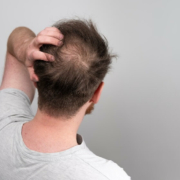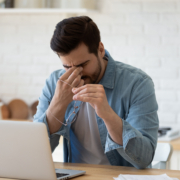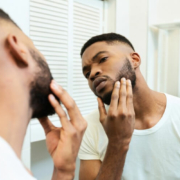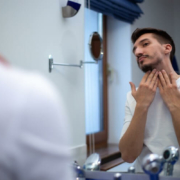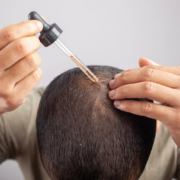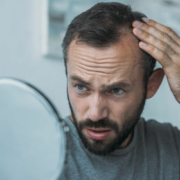7 Reasons Why Your Hair Is Falling Out (And How to Stop It)
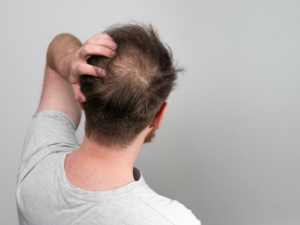
It’s easy to fall down a rabbit hole when doing internet research. A pimple can turn into cancer or flesh-eating disease in minutes. The same thing can happen when you lose your hair. First, you see a few strands of hair on the shower floor. Then, you find hair all over your towels and pillowcases. Worst of all, you’re starting to see receding, thinning, or balding areas. Before you know it, you’re online typing “Why is my hair falling out?” into the search bar. In no time, you’re convinced that you have some rare, fatal illness that’s making your hair shed. The truth is that there are some simple explanations for why you may be losing your hair. Although we don’t recommend self-diagnosis (we’ll talk more about that later), here are the most common reasons your hair may fall out.
1. You Can’t Fight Genetics
If one of your parents or relatives experienced thinning or balding hair, you might be next in line. Male and female pattern baldness, androgenetic alopecia, is passed from generation to generation and can stem from either side of your family. Male pattern baldness accounts for 95 percent of hair loss in men. (01) Although genetic hair loss is typically considered a “guys issue,” androgenetic alopecia is the most common cause of hair loss in women also.
How do you know if your hair loss is hereditary? There are some tell-tale signs, namely specific patterns of hair loss. Men usually see their hairline receding into an “M” shape. The circular area on the back of their heads thins and expands to create an “O” shape. Men can go bald from the condition. Women, on the other hand, don’t usually go completely bald. Instead, they get diffuse thinning that begins on the part line and expands out.
If your hair loss is hereditary, early action with the right medication can help slow down or stop your hair loss and help regrow new hair. Minoxidil is a well-known option that prevents or reverses the miniaturization of the hair follicles. It allows existing hair to remain healthy and new hair to grow. DHT blockers are often needed in conjunction with Minoxidil to prevent testosterone from converting to DHT and attacking your hair follicles. The most commonly prescribed DHT blockers are Finasteride, Dutasteride, and Spironolactone for women.
2. You’re Having an Autoimmune Response
Some types of alopecia are due to an autoimmune disease called alopecia areata. Before you freak out, though, consider this. Your lifetime risk of experiencing alopecia areata is only 2.1 percent. (02) Alopecia areata causes circle-shaped patches of hair loss on various parts of your scalp. Hair can spontaneously regrow without any treatment. However, some people experience relapse. Alopecia areata is diagnosed via visual examination, blood tests, and possibly a small biopsy.
First-line treatments may include corticosteroids and Minoxidil. A psoriasis medication called Anthralin or Oluminant, a new medication that was recently FDA approved, may be prescribed for more severe cases.
3. You’ve Had Surgery or Been Sick
You may not realize that surgeries requiring anesthesia and illnesses that cause high fevers can cause a temporary type of alopecia called telogen effluvium. Some people who had severe cases of Covid were affected. When there’s a rapid increase in stress levels in your body, your hair goes into a type of shock called telogen effluvium. Telogen effluvium speeds up your hair’s growth cycle and pushes it into the resting stage. During the resting stage, your hair falls out. The disruption is temporary, though, and usually only lasts for a few months. After that, your growth cycle gets back on track, although it may take a few months more to see regrowth.
4. You’re Stressed Out
If you’ve been under a lot of pressure at work or are experiencing a breakup, the stress could take a toll on your hair. During a 2021 study, researchers discovered that a particular stress hormone called corticosterone can impair the stem cells needed to promote hair growth in mice. When mice were subjected to mild stress for many weeks, corticosterone levels increased, resulting in telogen effluvium. (03) Life happens, and you can’t always get rid of your stressors, so finding ways to manage your stress may help if you notice hair loss. Exercise, deep breathing, meditation, progressive muscle relaxation, and connecting with others are good ways to unwind and help your body reset its hair growth cycle.
5. Your Hair Needs Some TLC
Do you know why Ariana Grande first started wearing her signature high ponytail? It was because her hair was damaged by the dye she used while filming the series Victorious. Yes, harsh chemicals and hairstyles, such as tight braids pulling on your scalp can make your hair break or fall out. Straightening treatments, including Brazilian blow-outs, are also very harmful. If your hair is suffering, there are still things you can do to make it healthy again and prevent further hair loss. A hair mask or deep conditioning treatment can bring some moisture back. A haircut can remove dead ends. If your hair is falling out due to traction alopecia, hair loss caused by pulling on your hair too much, don’t despair. Your hair will grow back once you stop damaging it. If you find that your hair isn’t growing back, be sure to check with your dermatologist.
6. You’re Experiencing Side Effects From A Medication
Hair loss isn’t one of the side effects usually listed on medications, and it’s relatively rare, but it can happen. Antidepressants, certain nonsteroidal anti-inflammatory drugs (NSAIDs), thyroid medications, steroids, and hormone replacements can be culprits. If you think one of your medications could be to blame, don’t stop taking it. Always consult with your doctor before making any changes.
7. Your Lifestyle Could Use Some Improvement
We’re human, and we all have some vices. But iif you’re concerned about your hair falling out, it may be time to rethink your lifestyle. Let’s start with smoking. Smoking could affect your hair by causing vasoconstriction and damaging your hair follicles. If you’re prone to androgenetic alopecia, it can also make you produce more DHT. (04)
Then there’s alcohol. There isn’t any scientific evidence out there that indicates that drinking alcohol affects your hair. Excessive drinking, however, can cause or contribute to medical issues that could affect your hair. Remember how we talked about stress causing telogen effluvium? Alcohol in excess could become a stressor if it affects your overall health.
You may also want to evaluate your diet. Certain foods can increase testosterone, which can potentially convert to DHT. Processed and sugary foods are an example. Too much sugar can cause your body to produce more insulin, increasing androgens. According to Dr. Ben Behnam, board-certified dermatologist and founder of Happy Head, people who are concerned about hair loss should also choose their protein carefully. Caged chickens produce more testosterone due to the stress of being held captive. It’s best to choose free-range chicken. Whey protein is also an excellent source of protein, but choose the type you use carefully. Whey protein isolate is highly processed and can contribute to hair loss, while whey protein concentrate supports hair health and regrowth.
Early Hair Loss Treatment is the Best Hair Loss Treatment
Now that we’ve shared the most common reasons why our patients experience hair loss, we want to go back to why we don’t recommend self-diagnosis. The key to reversing hair loss is catching it early and beginning treatment while your hair follicles are still viable. You could lose valuable treatment time If you diagnose yourself and are wrong. Be sure to visit your dermatologist for an exam.
We’re Here to Help
If you don’t have access to a dermatologist or have questions about whether hair loss treatment is right for you, we’re here to help. Simply answer some brief questions designed to help us better understand your hair loss concerns, and a board-certified dermatologist and hair specialist will be assigned to your case.
Resources:
(01) https://www.americanhairloss.org/men_hair_loss/index.html
(02) https://www.naaf.org/alopecia-areata
(03) https://www.nih.gov/news-events/nih-research-matters/how-stress-causes-hair-loss
(04) https://www.ncbi.nlm.nih.gov/pmc/articles/PMC9069908/#:~:text=Smoking%20may%20lead%20to%20hair,enhancing%20senescence%20and%20hormonal%20effects.

